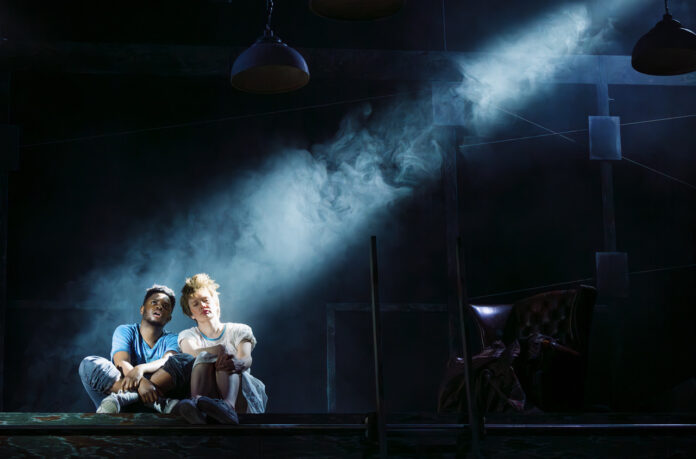Wuthering Heights‘ reputation as one of the literary world’s great love stories has always been fiercely contested, but in Inspector Sands version it’s incontrovertibly ignored, more morality play than any form of palpable romance.
And while Cathy (the very tom-boyish Lua Bairstow) and Heathcliff (Ike Bennett) may have been inseparable childhood friends, on the Oxford Playhouse stage their juvenile emotions do not mature into any kind of tangible and sustainable relationship – Emily Bronte’s traditional scenes of Cathy knocking at the windows begging to be let in, starkly absent.

Instead, Inspector Sands‘ stunning and utterly bleak adaption is all about the abuse, power, coercion, control, hate, revenge, ignorance and cruelty that manifests itself at Wuthering Heights and subsequently at Thrushcross Grange.
Mr Earnshaw’s social experiment – bringing a boy home, found on his travels, and adopting him as his son – is as totally relatable today, as are the petty jealousies, cruelty and claustrophobia of their existence shut away on the Yorkshire Moors. After two years of living a similar existence we are well aware of the suspicions, paranoia and social and domestic tensions that can arise.

The focus instead is on whether it’s possible to create a monster – Heathcliff’s bent on utter annihilation and revenge is hard to watch. Throw in the dark gothic set, the cawing of crows and the howling winds, and our isolation is complete.
There is no comfort, no respite, no relenting, as generation after generation are brutally despoiled, ruined, conned, tricked and neglected, the only human respite provided by the loyal servant Nelly, played so brilliantly by Giulia Innocenti. read our interview with Guilia here

It’s hard to watch but impossible to tear yourself away, whisking you through the intergenerational trauma as character after character falls by the way side, the audience at Oxford Playhouse clinging on tight on this roller-coaster ride of black emotion.
And yet there are light patches, mainly glimpsed through the constant dark humour, which takes you by surprise, as the tale winds itself to its self destructive end.

It’s a relief when Heathcliff finally gives up, only realising that his life’s mission to entirely destroy everyone in his path is ultimately unfulfilling. And only then can life start again.
The young Hareton (John Askew) and Young Cathy’s (Nicole Sawyerr) genuine romance, is like watching tender green shoots pushing up through the earth as their affection and compatibility only emphasise what Cathy and Heathcliff failed to achieve.

In terms of bringing you a Wuthering Heights to remember, this is it, and an absolute #must see production that stays with you long after the curtains come down, provoking some really interesting post-production conversations.
Unforgettable in fact, but love? I think not.
Wuthering Heights is at Oxford Playhouse until Saturday May 13. Book at https://www.oxfordplayhouse.com/events/wuthering-heights

















